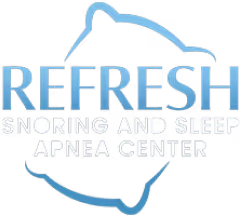

Sleep Apnea Treatment Near Lakewood, CO
Tired, snoring, or waking unrefreshed? Refreshed Sleep welcomes patients from Lakewood. We provide clear, evidence‑informed sleep care at our Denver clinic and at our Castle Rock clinic. Many first steps can be done virtually, so getting started is easy.

.svg)
Visit Us in One of Our Branches Near You!
Certain sleep-related issues often remain unnoticed since their main symptoms occur during sleep, making the affected person unaware of the problem.
If the people around you complain that you snore, it’s best to seek sleep apnea treatment in our Denver or Castle Rock clinics. It’s the situation with both obstructive sleep apnea (OSA) and sleep-related bruxism.
OSA is a condition characterized by reduced oxygen levels and, sometimes, waking up due to increased effort in breathing. The latter condition is caused by partial or complete obstruction of the upper airway during sleep.
However, since these events happen while asleep, the individual experiencing them may not be conscious of the breathing difficulties.



Teeth Grinding and Sleep Apnea
Sleep-related bruxism is another condition often unnoticed but requires immediate sleep apnea and snoring solutions. It involves grinding or clenching the teeth during sleep, leading to dental issues and jaw discomfort.
But since these actions occur unconsciously during sleep, the person is usually unaware of the grinding or clenching.
Due to the lack of awareness, it is essential to pay attention to other indicators or symptoms that may suggest the presence of these sleep disorders, such as morning headaches, daytime fatigue, or reports from a sleep partner about unusual sleep behaviors, like snoring and sleep apnea.
Risk factors
Research indicates that the occurrence of bruxism is significantly higher in the age group of 18 to 29 years, while it is less prevalent among individuals aged 60 years and above.
Children also experience teeth grinding. However, they generally outgrow this habit once their baby teeth are lost.The following risk factors play a role in teeth clenching:
*Age
*Personality traits and behavior
*Chronic migraine
*Gastroesophageal reflux disease(GERD)
*Gender
*Genetic
*Psychoactive substances like tobacco, caffeine, and alcohol
*Recreational drugs
*Stress
*Tinnitus
*Sleep apnea and snoring
Moreover, a history of teeth clenching during childhood can provide valuable insights into the likelihood of bruxism in adulthood.
Interestingly, genetic polymorphism, GERD, and bruxism are all recognized as relevant and significant risk factors in the development of bruxism.
Understanding these factors is crucial in diagnosing and managing bruxism effectively.Bruxism can be triggered by certain medical conditions, including:
1. ADHD - Children with Attention Deficit Hyperactivity Disorder (ADHD) may experience teeth grinding due to medications they take and frequent sleep disturbances associated with the condition.
2. Autism - Bruxism can be caused by antipsychotic medications prescribed to manage the high levels of stress experienced by patients with autism.
3. Sleep disorders – Snoring and sleep apnea, mumbling or sleep talking, and constant awakenings increase the prevalence of bruxism.
4. Cerebral Palsy – This neurological disorder impacts muscle coordination and body movement, leading to bruxism as a secondary condition due to abnormalities in the patient's oral cavity system.
5. Down Syndrome – As a genetic disorder, Down Syndrome can cause smaller than normal teeth, missing teeth, and occlusion with crowding, which triggers tooth-grinding episodes.
6. Parkinson’s Disease – This progressive and chronic disorder affects the central nervous system and may contribute to bruxism in affected individuals.
7. Fibromyalgia – Characterized by musculoskeletal pain, fatigue, sleep mood, and memory changes, Fibromyalgia's sleep disturbances can increase the likelihood of nocturnal bruxism episodes.
Understanding the connections between bruxism, sleep apnea, and snoring is crucial for healthcare providers to provide appropriate care and management for those affected. Addressing bruxism in these cases can improve the patient’s oral health and overall well-being.



.avif)
.svg)
Remedies
There’s no single cure for bruxism, but it can be managed. Addressing it early helps protect teeth, reduce jaw discomfort, and improve sleep quality. Our team can review your symptoms and coordinate care through our Denver or Castle Rock clinics to help manage risk factors linked to snoring and sleep apnea.


.svg)

Get Help from an Accredited Sleep Disorder Clinic
Think you may have sleep apnea or nighttime teeth grinding? Talk with your dentist about any tooth or jaw changes, then contact Refreshed Sleep. We’ll review your symptoms and outline next steps through our Denver or Castle Rock clinics. We can help you sleep better.


